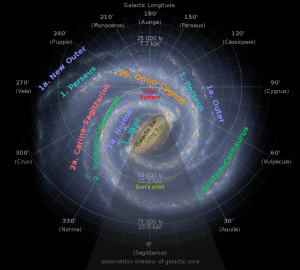When you think about the solar system, chances are you picture the planets orbiting the Sun. But that’s only part of the story — our solar system, including the Sun, is also orbiting the center of the Milky Way, the galaxy in which we reside. While a single orbit of Earth around the Sun takes a mere 365 days, a single orbit of the Sun (and the rest of our solar system, along with it) around the Milky Way takes nearly 230 million years.
It is that journey — the trip our planet, our star, and our entire solar system take together — that is the starting point for Galactic Tick Day: a new holiday that will be celebrated for the second — and the two-hundred-and-thirty-sixth — time June 26, 2018.
(The Sun, and the solar system, orbit the center of the Milky Way every 230 million years or so. Photo credit: R. Hurt & Cmglee – Wikipedia)
The story of Galactic Tick Day
According to David Sneider, one of the holiday’s creators, “[Galactic Tick Day] started out as a fun and quirky idea that actually has some pretty interesting ramifications.”
The holiday is celebrated every 633.7 days, or 1.7361 years, marking one “galactic tick,” which represents 1/100th of an arcsecond’s worth of the orbit of our solar system around the Milky Way. This unique holiday is meant to highlight the “larger cosmography that we find ourselves in,” Sneider says. “It’s not just a cool, interesting factoid – it also serves as a mechanism for more comprehensive thinking around the spatial and other systems we find ourselves in that we can’t necessarily directly intuit.”
Let’s start at the beginning. Chances are, you’ve heard someone say, “Oh, Mercury is in retrograde — I’d better be careful, I’m in for some bad luck.” Two years ago, one of Sneider’s friends said something along those lines in a conversation, and it sparked a realization.
While astrology is no longer considered a science (though we do have it to thank for the birth of modern astronomy, centuries ago), the idea that cosmic bodies and their motions have influence and meaning in our everyday lives has persisted. “You’re thinking about the movements of celestial bodies and then wrapping it some layer of superstition,” says Sneider. “And that line of thinking led [me] to thinking about other aspects of cosmic motion that go unrecognized or misunderstood. And I thought, ‘How about a holiday to celebrate the journey of our solar system around the Milky Way?’”
From that thought, Galactic Tick Day was born. 2018 is the second time the event will be held, following its inaugural celebration in 2016. However, as you might recall from above, 2018 is also the two-hundred-and-thirty-sixth occurrence of Galactic Tick Day — that’s because, according to the holiday’s website, “The first Galactic Tick Day was one Galactic Tick (1.7361 years) after Hans Lippershey filed the patent for the first telescope on October 2nd, 1608. This is in honour of the telescope’s power to allow us to achieve awareness of the nature of the universe.”
Just a starting point
The holiday itself, Sneider says, is really just a starting point to talk about the larger picture of our solar system and the place it holds in our galaxy. It’s about prompting people to “recognize that there are systems that are happening faster or slower, larger or smaller, above and below what we can naturally intuit at the human scale.” Establishing a holiday, he says, “is just a quirky and fun way to bring people to a new plane,” but from there, the conversation can only grow.
“Holidays are a form factor to bring attention to things that are always happening, to create some space for delight,” Sneider says. He points out that we have New Year’s Day parades, summer solstice celebrations, even evening rituals that are tied to cosmic motion. These events are all heavily tied into human intuition, in tune with our everyday and annual cycles; Galactic Tick Day simply “steps up a layer” to expand human awareness of ourselves and our place in the universe outward. The idea to create a holiday, he says, came from the success of Mother’s Day, which took more than two decades from inception to become a recognized holiday. As time progresses, he hopes Galactic Tick Day will become as widespread and as well known.
Ultimately, Galactic Tick Day is a platform from which to springboard thoughts and conversations about the larger scale than just our small, everyday lives. Galactic Tick Day reminds us that the world is bigger than we are, that we should think on a global scale, and that we should find reasons to celebrate our togetherness within a larger moving, changing system.
After all, we’re all here on Earth, circling our Sun with our fellow planets, and we’re all taking the same journey around the Milky Way together, one galactic tick at a time.
Join in!
Would you like to join in the celebration? galactictick.com has several suggestions on how you can participate, from spreading the word in person and on social media to taking some time to contemplate how you can make our galactic journey a little nicer for everyone who shares this single, amazing planet with you.
You can also reach out to Galactic Tick Day for more information, sign up for their informative newsletter, or attend the event on Facebook.
Source: astronomy
Ask me anything
Explore related questions







